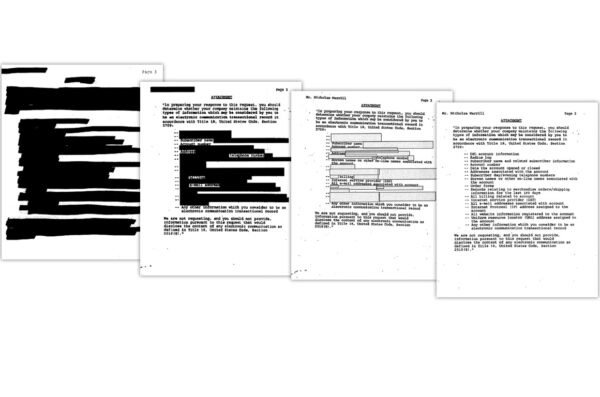ACLU Asks Appeals Court To Affirm Decision Striking Down Patriot Act ”National Security Letter” Provision
FOR IMMEDIATE RELEASE
CONTACT: media@aclu.org; (212) 549-2666
Gag Orders Are Unconstitutional And Allow The FBI To Conceal Abuse, ACLU Says
NEW YORK - In a brief filed under seal on Monday and unsealed yesterday, the American Civil Liberties Union urged a federal appellate court to uphold a lower court decision striking down the National Security Letter (NSL) provision of the Patriot Act. The provision gives the FBI the authority to issue letters demanding private information about people within the United States, and to place the recipients of the letters under indefinite gag order. A report released on Thursday by the Department of Justice’s Office of the Inspector General (OIG) revealed widespread, systemic abuse of the NSL power by the FBI.
“The district court was right to find that the FBI can’t be given the unreviewable power to impose gag orders on the recipients of national security letters,” said Jameel Jaffer, Director of the ACLU National Security Project. “The FBI’s power to silence the recipients of these letters has to be subject to judicial oversight. Without that oversight, the FBI can misuse its power to conceal abuse and silence its critics, which is exactly what it’s been doing.”
Yesterday’s OIG report revealed that the FBI issued tens of thousands of NSLs in 2006. Among other abuses, the FBI misused NSLs to sidestep the authority of the Foreign Intelligence Surveillance Court (FISC), according to the report. In one instance, the FBI issued NSLs to obtain information after the FISC twice refused its requests on First Amendment grounds.
The OIG also found that the FBI continues to impose gag orders on about 97 percent of NSL recipients and that, in some instances, the FBI failed to sufficiently justify why the gag orders were imposed in the first place.
An earlier OIG report detailing privacy breaches and misuse of NSLs between 2003 and 2005 led the FBI to issue new guidelines for use of the letters in June 2007.
“The Inspector General’s report makes it strikingly clear that the FBI has been given far too much surveillance power,” said Melissa Goodman, staff attorney with the ACLU National Security project. “The government should not need internal guidelines to tell it not to break the law, and even with new guidelines in place we believe serious abuses still occur.”
The brief unsealed yesterday relates to a lawsuit filed by the ACLU in April 2004 on behalf of an Internet Service Provider (ISP) that received an NSL. Because the FBI imposed a gag order on the ISP, the lawsuit was filed under seal, and even today the ACLU is prohibited from disclosing its client’s identity. The FBI continues to maintain the gag order even though the underlying investigation is more than four years old and may well have ended, and even though the FBI abandoned its demand for records from the ISP over a year ago.
In the lawsuit, now called Doe v. Mukasey, the ACLU initially challenged both the FBI’s power to demand records without judicial oversight and its power to impose gag orders on NSL recipients. Judge Victor Marrero of the U.S. District Court for the Southern District of New York struck down the NSL statute in September 2004, ruling that the FBI could not constitutionally demand sensitive records without judicial review and that permanent gag orders violated the First Amendment guarantee of free speech. The government appealed the ruling, but Congress amended the NSL provision before the court issued a decision. The ACLU brought a new challenge to the amended provision, and in September 2007 Judge Marrero again found the statute unconstitutional. The government is again appealing.
“The FBI's practically unfettered power to gag NSL recipients skews public debate about the wisdom of granting this FBI this kind of intrusive surveillance power,” said Goodman. “The statute grants the FBI sweeping censorial authority but fails to provide safeguards that the Constitution requires. The district court was correct to find the statute unconstitutional.”
The FBI has used its gag power to censor court filings in the ACLU’s case and to shield even innocuous information from public view.
“These efforts,” said Arthur Eisenberg, Legal Director of the New York Civil Liberties Union, “extend well beyond protecting classified information and reflect an intention to suppress criticism of government overreaching.”
For example, the government once redacted from an ACLU brief the statement that the gag order was “an irresponsible invocation of national security to justify unnecessary secrecy.” In a declaration filed by John Doe, the government redacted the statement that “the public should be able to monitor how the government is using [its Patriot Act] powers so that it can police against possible abuses.” The government even once redacted language taken directly from a Supreme Court opinion, “the danger to political dissent is acute where the Government attempts to act under so vague a concept as the power to protect ’domestic security.’ Given the difficulty of defining the domestic security interest, the danger of abuse in acting to protect that interest becomes apparent.”
More examples of information the government has censored in court filings in this case and another ACLU case challenging a gag order are available online at:
www.aclu.org/safefree/nationalsecurityletters/26454res20060814.html and www.aclu.org/safefree/patriot/18491res20040819.html
The ACLU also filed a lawsuit last June to enforce its Freedom of Information Act request to force the Department of Defense and the CIA to turn over documents concerning those agencies’ use of NSLs. That lawsuit is pending. Thus far, the ACLU has obtained hundreds of documents from Department of Defense about its use of NSLs.
Attorneys in Doe v. Mukasey are Jaffer, Goodman and L. Danielle Tully of the ACLU National Security Project and Eisenberg of the NYCLU.
The ACLU’s brief can be found online at:
www.aclu.org/safefree/nationalsecurityletters/34476lgl20080310.html
More information on Doe v. Mukasey and NSLs is available online at: www.aclu.org/nsl


